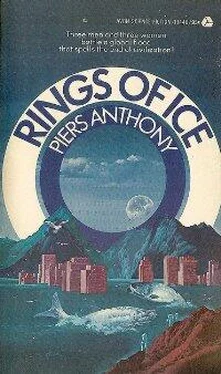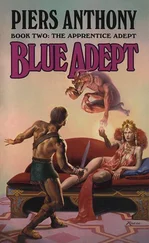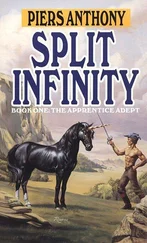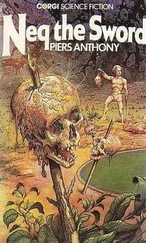Gordon paused, and it was almost as though his lip curled. “I propose a compromise. We head for Jacksonville —but only if the road is open and unflooded. If we make it there, we search for Zena’s mother. If we can’t find her within six hours, we give it up. We give up all relatives—mine included.”
“But that—” Gus started, realizing the scope of the compromise.
“Put it to a vote,” Gordon said. “We’re a democracy, aren’t we? Maybe it was something else when it started, but everybody has something to contribute to our survival and so everyone has a fair say.”
Gus wanted to protest that too, but Karen put her hand on his arm. “I think that’s fair, don’t you?” she murmured to him.
Gus glanced at her, obviously unwilling to set her against him. Again, Zena felt that turn in her stomach. What means was Karen using to achieve what ends? Was she trying to help the group, or Zena—or herself?
“I proposed the vote, so I’ll exclude myself,” Gordon said. “Ladies first. Floy?”
“Gee—” Floy began, flattered at the designation.
“Oh, go ahead and see Jacksonville!” Gus said. “But you’re making the same mistake as before.”
That was another strike at Zena: the lost hour when they had searched in vain for the black girl.
“I’ll turn east at the next interchange,” Gordon said. “We’ll find it.”
The chance came within two miles. Gordon turned, and they were soon on a two-lane road. There were traffic lights here, but all were dead, and there was no other traffic. Gordon drove on through without pausing.
Then they approached a city or town: no road signs remained visible, but stalled cars blocked the road, forcing maneuvering. Zena peered through window and rain at the buildings, and thought she saw faces peering back at her. Children’s faces, but not animated. The effect was eerie.
“Look at that!” Floy cried, pointing ahead.
It was a store, a supermarket—and it was burning. The rain stifled the flames outside, but the interior was gutted. Several shapes lay before the broken glass frontage. They resembled human bodies.
“There must have been a battle royal,” Gus said. “They got hungry and fought over food—and now it’s all gone up in flames.”
“None left for us,” Floy said wistfully.
A man ran out before the bus, waving his arms in the air. Gordon slewed to avoid him, then gunned the motor. They heard a faint shout over the rain-beat—and saw other figures emerge from buildings ahead.
“Suddenly I don’t like this!” Gordon said. “They’re crazed—and if we stop, they’ll get aboard—and we may not get moving again.”
Glass shattered. Then they heard the sound of the gun. Someone had shot out the kitchen window.
“Turn around!” Gus screamed. “Get us out of here— before they hit the motor or tires!”
Abruptly Zena saw the utter futility of her effort. They had hardly come five miles toward Jacksonville, and already they were under fire. They could never make it— and the chances were that her mother, trapped in a worse area than this because of the denser population and lower terrain, was dead already.
Gordon turned the bus around, skidding on the slick pavement. Figures were all around them, brandishing sticks and pistols. Gordon backed up rapidly, and there was a bang and a scream. He plunged forward—and another figure went down. The bus jerked violently, first the front, then the rear.
Zena clawed her way toward the bathroom, but didn’t make it. She vomited on the hall rug.
Now Gordon was speeding well above the safe rate, back through the half-living town, one hand on the horn almost continuously. “Gloria could cry,” he muttered wistfully.
“To think,” Karen said as she hung on to the kitchen sink, “that this was once a typical, peaceful, conservative suburban community—three days ago.”
A hand came down to help Zena up. It was Gus. “I didn’t mean it to be like this,” he said. Then he lurched into the bathroom and spewed the content of his own stomach into the little sink.
Zena understood.
Miraculously they escaped with no worse damage than the broken window. Thatch put cloth across it, and they resumed travel on the comparatively safe interstate. They had won through to higher ground. The dancing lakes of the lowlands were replaced by the ugly erosion of the slopes. And mischief of another nature.
Gordon was driving again, Floy keeping him company. They had settled into shifts: Gus and Karen, Gordon and Floy, Thatch and Zena. Night was coming, though this made less difference in the rain than it would have ordinarily. At the moment the non-driving shifts were confused, for Gus and Thatch were snoozing at the rear. Zena was playing honeymoon bridge with Karen in the alcove.
“One diamond,” Zena bid, considering her dummy.
“One h—” Karen responded as a tire blew out.
The bus lurched. Gordon had been doing twenty-five, his maximum safe speed in the rain. But as the vehicle slewed about, it seemed like seventy.
A second tire blew. The bus bumped to a halt.
“Something in the road,” Gordon said. “Glass or nails—had to happen sometime. We’ve been lucky until now.”
“You’re too damn philosophical!” Floy complained. “If you aren’t going to swear, do you mind if I do?”
Gus and Thatch came up, single file. “Blowout?” Thatch asked. “I can fix it.”
“No you don’t!” Gus said. The others looked at him. Was Gus actually volunteering?
“Think it through,” Gus continued. “Glass from an accident—and no dead cars in the road? Why didn’t the rain wash it out?”
“We don’t know it’s glass,” Zena said.
“All the same, don’t go out there till we’re sure!”
“How can we be sure what it is without looking first?” Floy asked.
“Not what, who!”
“It’s a paranoid suspicion,” Zena said. “We haven’t seen any other people since—”
“Since this morning,” Karen said.
“Find weapons,” Gus said. “We’ve got hammers, screwdrivers—”
“I’ll change those tires myself,” Zena cried, disgusted. Gus would rather invent fantastic outside conspiracies than face the prospect of work. She stepped down and pushed open the door.
A heavy hand fell on her shoulder, hauling her into the night. She screamed. Another hand clamped over her mouth. She bit it.
Then it was a wild nocturnal struggle. She threw someone over her shoulder, but was borne down by another. Figures tumbled out of the door.
There was a snarl, whether animal or human she could not guess. A man screamed, horribly. Zena’s attacker jerked away and ran off through the rain.
Zena stood. Another shape loomed, framed by the lights of the bus. She settled into a defensive posture.
“Zena?” It was Gordon’s voice.
Her body suddenly felt weak. “Yes! Are the others—?”
“Yes. Only Floy and I came out. Didn’t want to risk fighting among ourselves. I think there were only two ambushers. You’re quite a scrapper!”
“I was terrified! You drove them off.”
“Not I,” he said. “Gloria wields a wicked hatpin, but I use my fist—and that scream came before I could mix in.”
A yellow streak went up the steps and under the dinette table. “Dust Devil!” Zena said, comprehending the scream. “What an ally in a night fight!” She followed the cat in to see what it carried. The object was small and whitish under the blood. “Oh-oh!”
“Let me see that!” Gordon said, putting his hand on the cat. “My God!”
“What is it?” Karen demanded.
“An eyeball,” Gordon said.
“Nonsense! That little creature couldn’t have—” She paused looking at Floy. The girl was licking off her fingers.
Читать дальше










